Introduction: In this article, Melissa Davenport Berry writes about the punishments endured by the Southwick family at the hands of the 17th century Puritan authorities in the town of Salem, Massachusetts. Melissa is a genealogist who has a blog, AnceStory Archives, and a Facebook group, New England Family Genealogy and History.
My last story covered the conflict of a memorial statue to honor the Quakers (Lawrence and Cassandra Southwick) who suffered persecution for their religious beliefs in Salem, Massachusetts, in the 17th century. Frederick Fanning Ayer, a wealthy philanthropist, wished to gift the statue and all the expenses, but the local authorities deemed the subject, and the design of the statue, to represent a dark period in history many wanted to forget (see: A Monument for Persecuted Quakers Upsets Salem, MA).
The best sources to research your early Quaker ancestors are court records, like the Records and Files of the Quarterly Courts of Essex County on the University of Virginia site. Also, historical accounts citing legal documents. In addition, I found some great articles in GenealogyBank’s Historical Newspaper Archives.
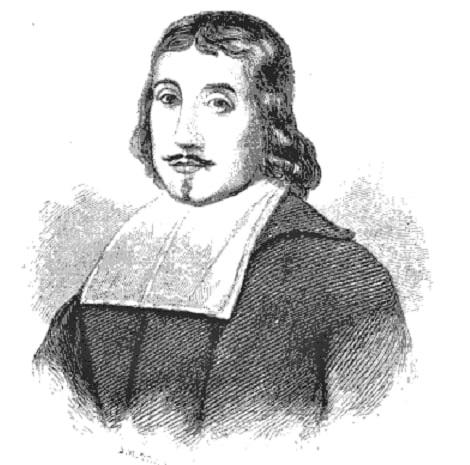
In 17th century Salem, the chosen church of the Puritans was the only lawful one – and to absent oneself from the mandated meetings meant fines, whippings, mutilation, branding, and banishment. Also, it was illegal to harbor Quakers. Salem had a nest of Quakers and here is a taste of what the Southwick family was up against, as noted in the Vermont Telegraph citing extracts from the records of the General Court of Massachusetts.
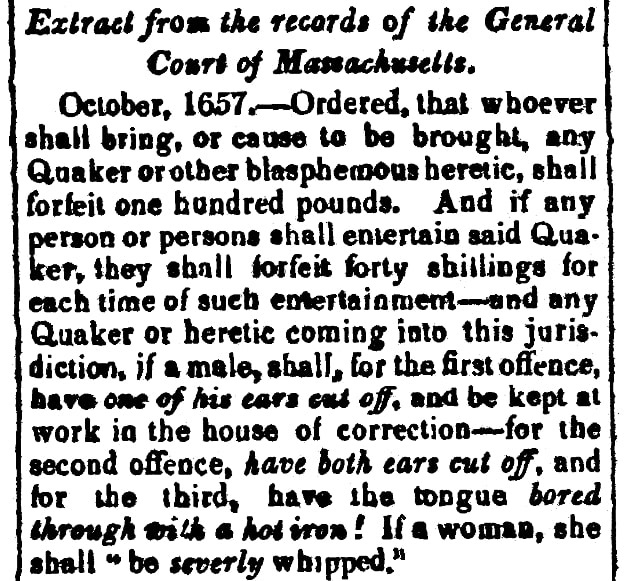
This article reported:
“October, 1657. – Ordered, that whoever shall bring, or cause to be brought, any Quaker or other blasphemous heretic, shall forfeit one hundred pounds. And if any person or persons shall entertain said Quaker, they shall forfeit forty shillings for each time of such entertainment; and any Quaker or heretic coming into this jurisdiction, if a male, shall, for the first offense, have one of his ears cut off, and be kept at work in the house of correction; for the second offense, have both ears cut off; and for the third, have the tongue bored through with a hot iron! If a woman, she shall ‘be severely whipped.’”
The Morning Star cited the punishment Lawrence and Cassandra Southwick faced from the magistrates when they entertained Quakers in 1657.
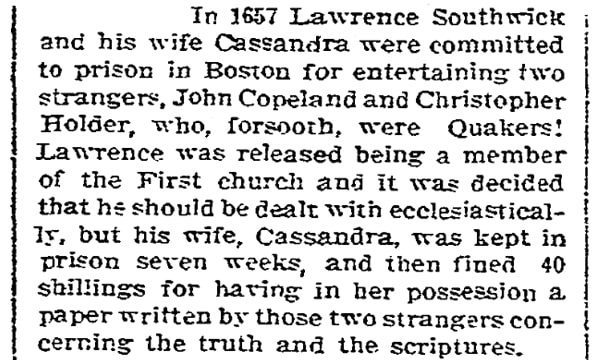
This article reported:
“In 1657 Lawrence Southwick and his wife Cassandra were committed to prison in Boston for entertaining two strangers, John Copeland and Christopher Holder, who, forsooth, were Quakers! Lawrence was released, being a member of the First Church, and it was decided he should be dealt with ecclesiastically, but his wife, Cassandra, was kept in prison seven weeks, and then fined 40 shillings for having in her possession a paper written by those two strangers concerning the truth and the scriptures.”
The Boston Herald cited the punishment for two of the Southwick children, who were to be sold into slavery to pay the fines their parents could not afford to pay!
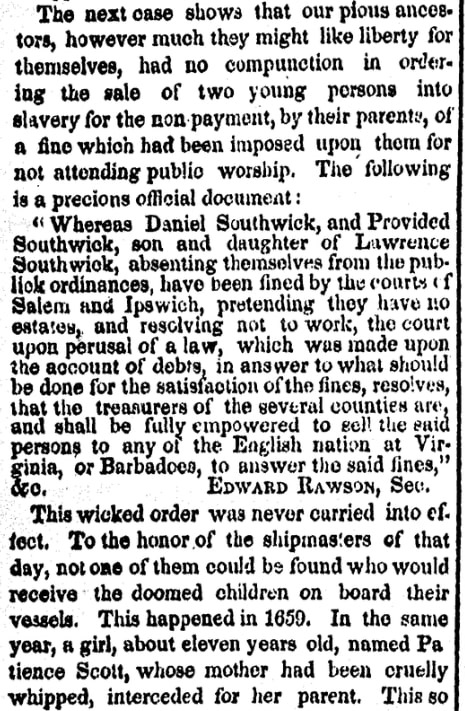
This article reported:
“Whereas Daniel Southwick, and Provided Southwick, son and daughter of Lawrence [and Cassandra] Southwick, absenting themselves from the public ordinances, have been fined by the courts of Salem and Ipswich, pretending they have no estates, and resolving not to work, the court upon perusal of a law, which was made upon the account of debts, in answer to what should be done for the satisfaction of the fines, resolves, that the treasurers of the several counties are, and shall be, fully empowered to sell the said persons to any of the English nation at Virginia, or Barbados, to answer the said fines.”
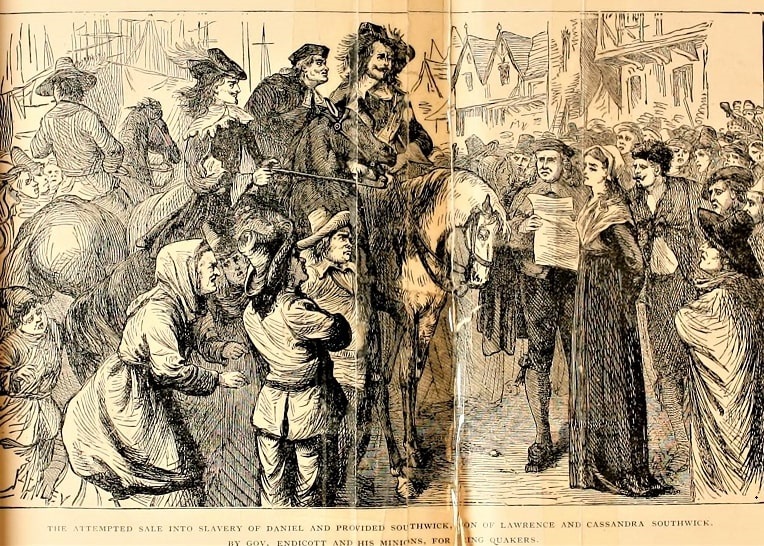
GenealogyBank has a 1910 reprint in the Morning Star of Rev. Nathan Southwick Hill’s article “Martyrs of Puritan Boston: Governor Endicott and the Quakers,” which appeared in the Christian Register. Rev. Hill, a direct descendant of Lawrence and Cassandra Southwick, recalled the horrible tragedies the Quakers endured.

Hill believed historians did not want the word out on how Quakers were treated by the Puritan authorities, most notably by Governor John Endicott. Hill asserted that:
“The Quaker persecution opens a chamber of American horrors, and its revelations are as painful as those of the Spanish inquisition.”
Hill accused Salem of hiding Draconian facts on Governor Endicott, and cited the ballad on the Southwick’s tragedy by John Greenleaf Whittier:
“Mournful record of an earlier age,
That, pale and half-effaced lies hidden away,
Beneath the fresher writing of today.”
Up next: more from Hill and the Southwick family coming soon.
Explore over 330 years of newspapers and historical records in GenealogyBank. Discover your family story! Start a 7-Day Free Trial
Related Articles:

I thank you for your research into this upsetting chapter in our nation’s history. I am a direct descendant of Cassandra and Lawrence, and their story is shocking to me. I’ve known about it for many years and find it disheartening that the persecution of MA Quakers is overshadowed by the Salem Witch Trials. There was plenty of misery around in those early days.
Hi Susan, I appreciate your comment. I will continue back with the Quakers next week so stay tuned, and the Southwick family will be back in the stories when I do more on Salem. Thank you so much.
Have you found any information regarding my ancestor Richard Werner?
These wonderful people, Lawrence and Cassandra Southwick, are my family and I am proud to know that they were willing to learn. Because of these two people I am a reader of the Words of God.